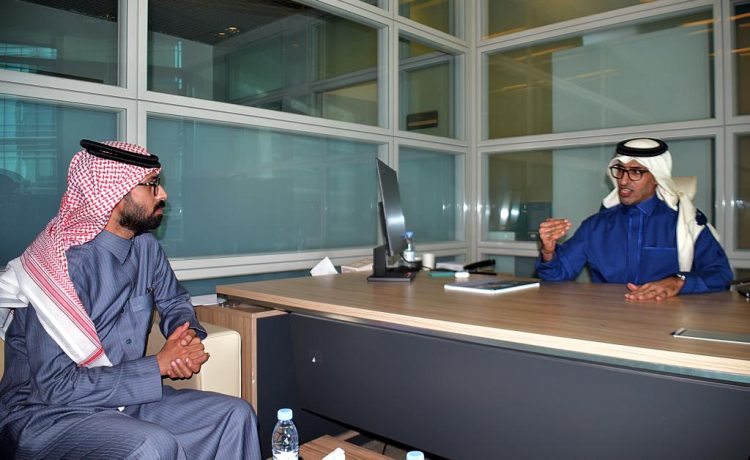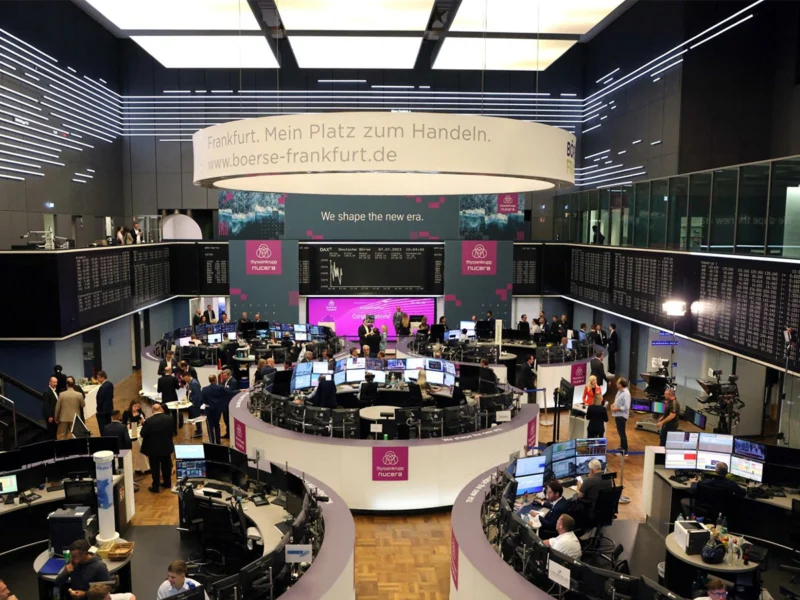Publisher: Maaal International Media Company
License: 465734
Al Marzouqi: GCC customs union file to be completed before the end of 2024, Free trade negotiations with China, Britain, and New Zealand being conducted
اقرأ المزيد
Interview by Fahd Al-Talal
“Dr. Raja bin Manahi Al Marzouqi, General Coordinator of the Negotiations and Head of the Negotiating Team of the Gulf Cooperation Council – Chief Economic Advisor at the Ministry of Economy and Planning in the Kingdom of Saudi Arabia”, revealed that the Council, through intensive negotiations with five countries, to sign free trade agreements, namely the United Kingdom, the Republic of China, New Zealand, Islamic Republic of Pakistan, and Republic of South Korea, adding that a joint statement has been signed to launch free trade negotiations with Japan during the year 2024. The Council is also preparing to announce the start of negotiations with both India and Turkey, noting that there is a busy schedule and unprecedented movement at the table of the Cooperation Council for the Arab States of the Gulf in seeking to sign free trade agreements until 2026 AD. These efforts recently culminated in the signing of a free trade agreement between GCC and Pakistan and South Korea, which is the first free trade agreement to be signed since 2009. The signing of the agreements is considered a historic step that enhances Gulf economic integration and deepens economic and trade relations between the GCC countries and the world.

Dr. Al-Marzouqi added in an exclusive interview with “Maaal” newspaper, “We are trying, as a negotiating team, to negotiate with the largest possible number of countries during the coming period, taking into account the capabilities available in the GCC countries, and we have guidance from the Supreme Council and the Ministerial Council of the Gulf Cooperation Council countries on the importance of accelerating and expediting the signing of free trade agreements with countries of the world, opening up to the global economy, and strengthening the position of the Gulf Cooperation Council as an economic bloc among the global economic powers.
He pointed out the importance of free trade agreements, as they contribute to reducing costs for exporters, suppliers, and investors, remove any other non-customs obstacles, and contribute to enhancing the competitiveness of the Gulf economy. They also reduce the degree of uncertainty and risk for investors between countries. In light of the presence of these agreements, There are official channels between the two sides to address the challenges and problems faced by the private sector or citizens with ease, and the agreements contribute directly to increasing trade exchange between countries that sign free trade agreements, at the expense of other countries that have not entered into free trade agreements. This is called the shift of trade in favor of the agreement countries.

Regarding the steps of economic integration between the Gulf Cooperation Council and the file of the customs union and the common market, the chief negotiator confirmed: “Work is currently underway to complete the remaining files of the Customs Union before the end of 2024 AD, as directed by the leaders of the GCC countries, with work being done to complete the conditions for achieving the common market among the Cooperation Council for the Arab Gulf States. Because this constitutes economic benefits for the GCC countries and helps in creating an economic bloc with negotiating power based on the economic capabilities of the member states”.
Dr. Al-Marzouqi said that the customs union contributes to integrating the economies of the GCC countries to form before the outside world a single market with attractive economic potential and negotiating power, so that the GCC countries together become the No. 9 economy in the world. In this case, the movement of goods between the GCC countries without any obstacles reduces the cost of transportation among the GCC countries and reduces the time it takes for the commodity through the member states. Also, adopting a unified port to the outside world allows the entry of goods from any port or airport in the GCC countries and their transfer between the member states to unify the conditions and customs among all, and thus transporting goods within the GCC countries will be easier without significant obstacles. This will stimulate the economic competitiveness of the member states and improve their competitive capabilities at the international level in trade and investment, which will raise economic efficiency and contribute to raising the economic growth rates of the Council states and improve the income levels of citizens and residents.

The Chief Economist of Ministry of Economy and Planning Dr. Al-Marzouqi continued: “The integration steps begin with the free zone, followed by the customs union, then the common market, and then the monetary union. What concerns us during this period is the completion of the customs union, because it will be the turning point in economic integration between the GCC countries. As for the common market, which depends on the movement of individuals and funds, it is expected that if the customs union is completed, it will not take time, especially since some of its conditions are met among the member states”.
Al-Marzouqi explained: “The economic strategies and visions of the GCC countries were built on export-based development, which achieved success in the countries that adopted it, such as East Asian countries, in contrast to economic development that relied on import substitution, which did not achieve the desired success. For example, if we analyze the goals of Saudi Vision 2030, we notice the importance of economic openness to achieve them. One of the most important goals of Vision 2030 is to increase the percentage of the private sector’s contribution to the economy, increase the percentage of non-oil exports, attract foreign investment, economic diversification, raise the level of the citizen’s individual income by providing highly skilled and semi-skilled jobs, and reduce the percentage of unskilled labor in the labor market. International experiences have proven that countries that adopted export support through economic openness to the world were able to achieve the development goals that the economic vision in Saudi Arabia and the rest of the GCC countries seek to achieve. This means the need to integrate the Gulf economy with the global economy because increasing non-oil exports and attracting foreign investment will only come with greater openness with the global economy, and signing free trade agreements with countries of the world to allow achieving these goals, developing the human capabilities of the Gulf citizen and raising his level of income”.

Al-Marzouqi pointed out: “After the Bretton Woods deal in 1944 AD and World War II, all countries that were able to move in development from a late level to an advanced level began to open up to the global economy and sign free trade agreements, and among the most prominent countries that improved its competitiveness, opened its markets to the world, and focused on export-based development, are the Asian Tigers, as they were able to move from a low level of development to the fastest economically growing countries in the world. They also reduced the poverty rate and raised the income level of citizens”.
It is noteworthy that the name Asian Tigers refers to 4 economies: South Korea, Taiwan, Singapore and Hong Kong. In the period between the early 1960s and 1990s, the economies of these countries witnessed a major economic leap and rapid industrialization processes and achieved exceptionally high growth rates that exceeded 7% annually. These countries moved from poor consumer countries to productive and active countries in the global economy.
Al-Marzouqi continued, “For example, we have noticed a change in the structure of the global economy in favor of emerging developing countries. In 1990, the contribution of emerging developing countries did not exceed 34% of the total global output, while the famous Group of Seven’s contribution in 1990 was 48%, and now After 30 years, specifically in 2020 AD, the contribution of emerging developing countries to the global economy increased to 60%, compared to the decline in the G7 contribution from 48% to 28%. This would not have happened to developing countries without openness to the global economy and benefiting from it by enhancing exports to the international market by improving the competitiveness of the economies of these countries”.
Al-Marzouqi cited the negative experiences on the economy of countries that permanently protect local industries. He said that countries that focus on imports and permanently protect local industries will have a negative impact on the local economy and will not achieve the desired success. The countries of the Middle East and part of the countries of South America are a model of this unsuccessful experience, and all the countries that applied the import substitution model did not achieve the desired results. The problem lies in the fact that import substitution is easier from an applied standpoint for governments, so that decisions are made, customs tariffs are raised, borders are closed, or barriers are placed on any goods compete with local goods, and on the contrary, we find that countries that open up to the global economy have directly contributed to improving the competitiveness of local products and services. This openness is based on economic models and policies, and designing and implementing these policies requires sufficient time to achieve targeted results.

Regarding the importance of protecting local and nascent industries in the Gulf countries while opening up to the world, and the fear of the decline of these industries after free trade agreements, the General Coordinator of the negotiations stressed that “there is no risk in opening markets with the outside world, and in order to protect the nascent industries there will be protection but limited to a specific time, usually from 5 to 7 years, and because producers in local markets know that the markets will open at a known time, this will be reflected in the speed of their development, raising their efficiency, and their ability to compete with foreign products, which serves the economy and contributes to achieving the well-being of citizens, which is considered one of the most important objectives of the GCC governments.
He continued, “But if local products depend on constant state protection, this protection will lead over time to a decline in the quality of the local product and a weak motivation for development due to weak competition because it depends on protectionism from the state to achieve profits and stay in the market, and not on efficiency or competitiveness, and over time It focuses on reducing costs and increasing profits without focusing on quality or improving efficiency and innovation. All of these factors lead to high prices for the consumer, and also lead to monopoly or oligopoly as a result of the presence of a small number of producers who control prices. In addition, average prices in countries that rely on absolute protectionism are higher than average prices in countries open to the global economy, and if average prices rise, this leads to a decrease in real per capita income and an increase in the level of nominal wages, which weakens the competitiveness of the local economy.
He added: Protectionism is directing part of the state’s economic resources to a specific sector at the expense of other sectors or consumers, and if this sector is not competitive and cannot confront an external competitor, this means that it is a sector whose production cost is higher than the real cost, and to continue supporting such sectors. It is a waste of state resources at the expense of other priority sectors with a higher economic return, and those who can compete and continue with openness are the sectors that achieve a higher economic return.
Dr. Raja stressed the importance of economic blocs at the world level and in international relations, as he said, “More than 95% of the countries in the world are in economic blocs, and the bloc countries have a stronger voice and higher negotiating ability, and the countries of the world are keen to make some concessions and sign agreements with the major blocs to reach their markets, and the countries of the Gulf Cooperation Council, constitute a strategic weight in the international system with their energy reserves, which represent no less than 40% of the total global oil reserves and 23% of the global gas reserves, in addition to huge investments in energy. The unity of Gulf Cooperation Council countries under one umbrella, will allow them to achieve the development goals of the GCC countries.









